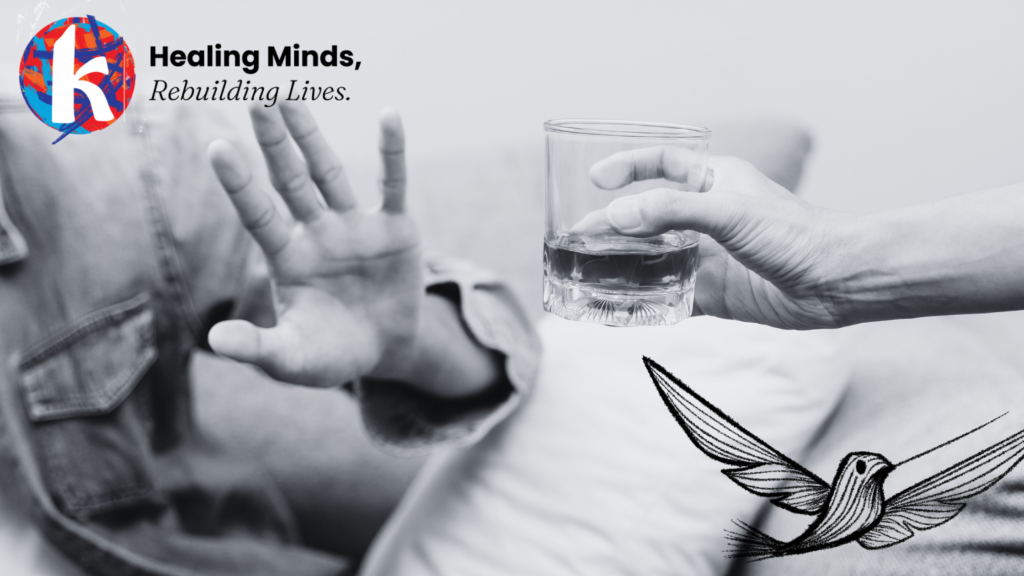The Impact of Alcohol on Ketamine Therapy: A Guide to Safe Healing
At Klarisana, we prioritize the safety and well-being of our clients during their mental health treatment journey. As part of this, it’s important to understand how different substances, particularly alcohol, can impact the effectiveness of ketamine therapy. In this blog, we’ll explore the interaction between ketamine and alcohol, the risks of combining the two, and why we strongly advise against drinking before or after your ketamine therapy sessions.
What is Ketamine?
Ketamine is a dissociative anesthetic now being used in mental health treatment, especially for individuals with treatment-resistant depression, PTSD, chronic pain, and anxiety. At Klarisana, we offer ketamine-assisted psychotherapy (KAP) to help clients unlock new perspectives and promote healing by resetting neural pathways. The effects of ketamine on the brain are profound, helping to create new mental patterns and offering relief for those who haven’t found success with traditional treatments.
The Effects of Alcohol on the Brain
Alcohol is a depressant that affects the central nervous system. While it may produce short-term relaxation or euphoria, alcohol ultimately slows down brain function, impairs decision-making, and negatively impacts mood. Over time, excessive alcohol consumption can lead to long-term mental health problems, including depression and anxiety.
Can You Drink Before or After a Ketamine Therapy Appointment at Klarisana?
The short answer is no—at Klarisana, we strongly recommend that clients avoid alcohol before and after their ketamine therapy sessions. Here’s why:
- Before Your Session: Drinking alcohol before a ketamine treatment can heighten sedation and lead to unpredictable side effects. Both ketamine and alcohol affect the brain’s ability to function, and combining them before a session can result in extreme drowsiness, impaired motor function, and even respiratory depression. This could not only make your session unsafe but also reduce the effectiveness of the treatment.
- After Your Session: Even after your ketamine session is over, the effects of ketamine linger in the brain and body as your neural pathways continue to reset. Consuming alcohol after treatment can disrupt this process, blunting the therapeutic effects of ketamine. Additionally, alcohol can impair your ability to integrate the insights gained during the session, which is critical for long-term healing. For your safety and to ensure the best possible results, we advise that you refrain from drinking alcohol for at least 24 hours after your treatment.
Does Alcohol Affect the Results of Ketamine Therapy Between Sessions?
Yes, alcohol can interfere with the results of ketamine therapy if consumed between sessions. Ketamine works by promoting neuroplasticity—helping your brain form new, healthier connections. Alcohol, on the other hand, acts as a depressant and can hinder this process by slowing down brain function and mood regulation.
If you drink between ketamine sessions, you may find that the progress made during therapy is diminished, and it could take longer to achieve the results you’re seeking. In addition, alcohol use can cloud your mental clarity, making it harder to reflect on and integrate the changes and insights you experience during therapy.
At Klarisana, we recommend minimizing or completely avoiding alcohol throughout your treatment process to ensure that your brain and body can fully benefit from the healing potential of ketamine.
Why Mixing Ketamine and Alcohol is Dangerous:
- Increased Sedation: Ketamine and alcohol both have sedative effects, and when used together, they can cause extreme drowsiness or even loss of consciousness.
- Impaired Cognitive Function: Both substances affect memory, judgment, and decision-making abilities, increasing the risk of accidents or injuries.
- Respiratory Depression: Alcohol and ketamine slow breathing rates, and using them together can result in respiratory depression, a condition where breathing slows down or stops completely, which can be life-threatening.
- Heightened Risk of Dependency: Combining substances can increase the risk of developing a dependency. People may turn to ketamine or alcohol for self-medication, which can complicate treatment and lead to long-term abuse.
The Role of Ketamine in Treating Alcohol Dependence:
While we advise against mixing ketamine and alcohol, ketamine may offer hope to those struggling with alcohol use disorder (AUD). Research has shown that ketamine, when combined with therapy, may help reduce cravings for alcohol and support long-term sobriety. It can help reshape the brain’s response to alcohol cues, providing an effective option for those working to overcome alcohol dependence.
That Being Said:
At Klarisana, we are committed to providing safe and effective ketamine therapy for our clients. To ensure the best possible outcomes, we advise all clients to avoid alcohol before and after their treatments. Alcohol not only presents immediate health risks when combined with ketamine but can also interfere with the long-term success of the therapy. If you’re undergoing ketamine therapy, it’s essential to stay informed about how alcohol can impact your progress and to discuss any concerns with your treatment provider.
If you have questions about ketamine therapy and how to optimize your treatment at Klarisana, we’re here to support you every step of the way. Contact us today to learn more about our services and how we can help you on your path to healing.





